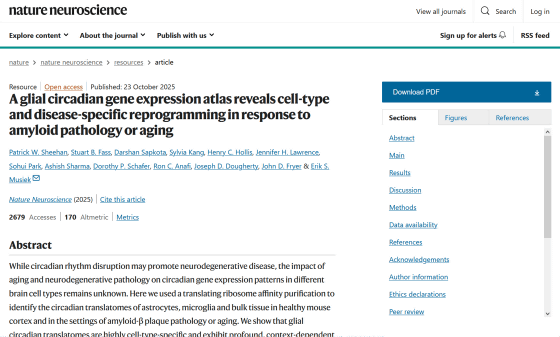Research reveals that Alzheimer's disease disrupts the circadian rhythm of brain cells that remove waste from the brain

Alzheimer's disease, which causes a decline in memory and cognitive function, is known to disrupt circadian rhythms in patients, such as difficulty falling asleep at night and increased daytime sleepiness. New research has revealed that Alzheimer's disease disrupts
A glial circadian gene expression atlas reveals cell-type and disease-specific reprogramming in response to amyloid pathology or aging | Nature Neuroscience
https://www.nature.com/articles/s41593-025-02067-1

Alzheimer's disrupts circadian rhythms of plaque-clearing brain cells – WashU Medicine
https://medicine.washu.edu/news/alzheimers-disrupts-circadian-rhythms-of-plaque-clearing-brain-cells/
In addition to disrupted sleep patterns, Alzheimer's patients also experience a condition known as ' sundowning syndrome ,' in which cognitive problems worsen in the evening and at night, suggesting that the progression of Alzheimer's disease is linked to the circadian rhythm that controls the sleep-wake cycle.
'We know that 82 genes are associated with Alzheimer's risk, and the activity of about half of them is controlled by circadian rhythms,' said Eric Musik , professor of neurology at the University of Washington School of Medicine and co-director of the Center for Biological Rhythms and Sleep (COBRAS). Changes in sleep patterns are one of the most frequently reported concerns by caregivers of Alzheimer's patients, and they begin early in the disease's course, before memory loss becomes apparent.
Muzik pointed out that disrupted sleep patterns not only place a burden on caregivers and patients, but also create biological and psychological stress, accelerating the progression of Alzheimer's disease. Therefore, Muzik and his research team conducted experiments to examine gene expression in brain cells with Alzheimer's disease using mice genetically modified to accumulate amyloid beta protein associated with Alzheimer's disease.
In a previous study, Musik discovered that the production of a protein called CHI3L1 (YKL-40) , a biomarker for Alzheimer's disease, is regulated by the circadian rhythm.
Proteins linked to Alzheimer's disease found to be regulated by circadian rhythms - GIGAZINE

Musik and his team examined gene expression in mice mimicking the early stages of Alzheimer's disease, healthy young mice, and old mice. The researchers took tissue samples from the mice every two hours over a 24-hour period and analyzed genes that were active during specific phases of the circadian cycle.
The results confirmed that the accumulation of amyloid beta disrupts the circadian rhythms of hundreds of genes in brain cells called microglia and astrocytes in a manner distinct from that caused by aging.
Microglia are involved in the brain's immune response and remove harmful substances and dead cells from the brain, while astrocytes are responsible for maintaining communication between neurons. The genes affected by amyloid-β accumulation primarily function to help microglia remove waste products such as amyloid-β plaques from the brain.
Although disrupting the circadian rhythm of genes does not mean they stop functioning completely, regular events may become sporadic, and brain cell functions, such as the removal of amyloid beta, may become less synchronized.
Furthermore, the researchers found that amyloid-β accumulation may induce new circadian rhythms in hundreds of genes that do not normally exhibit circadian rhythmic patterns, many of which are involved in the inflammatory response to brain imbalances, such as pathogen infections and the accumulation of amyloid-β plaques.

'There's still a lot to understand, but the key takeaway is that amyloid-beta accumulation somehow manipulates the body's internal clock, strengthening, weakening, or shutting it down in certain cell types,' said Musik. 'Ultimately, we hope to understand how to optimize the circadian system to prevent amyloid-beta accumulation and other symptoms of Alzheimer's disease.'
Related Posts:
in Science, Posted by log1h_ik






